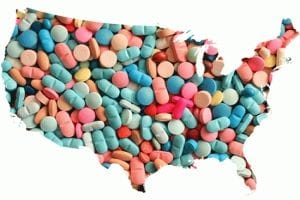Big Pharma's Direct to Consumer Advertising Corrupts America's Health Culture


In the last decade, the United States has seen a massive increase in prescription drug usage and abuse, the cause of which can be traced to irresponsible advertising and lobbying by pharmaceutical companies, collectively known as Big Pharma. Big Pharma includes some of the largest corporations in America, and is the largest lobbying group.
They spend billions of dollars a year on advertising directly to consumers (“ask your doctor if ____ is right for you”) and have made their pills household names. In fact, recent research indicates Big Pharma spends more on advertising than actually researching and developing ways to help sick people… almost twice as much.
The result of this advertising has a covert but significant effect on society. Names like “Xanax” and “Adderall” roll off our tongues as if we’re talking about “Tylenol.” Last year, 211 million opioid prescriptions were written… that’s enough to keep every adult in America medicated and pain free year around. According to a new report from the CDC, the rate of kids aged 15-19 dying of “poisoning” has nearly doubled, almost entirely due to increases in prescription drug overdoses.
An array of new maladies sickening Americans has appeared… restless leg syndrome? Low testosterone disorder? Erectile Dysfunction? Note that these conditions are only rising to prevalence in the United States. Around the rest of the world, these disorders are known as “aging.” Pharmaceutical advertising is creating a culture of diagnosis in the United States. A dangerous love affair with prescription pills is shifting the focus of the healthcare system from curing and treating to drugging and numbing.
The United States is among only one other nation (New Zealand) that allows direct-to-consumer advertising by pharmaceutical companies. Big Pharma spent $60 billion in 2011 on marketing. $14 billion of that was spent marketing to the 60,000 doctors who can write prescriptions (roughly $23,000 per doctor). $4 billion was spent on direct-to-consumer adverts, a tactic so profitable for Big Pharma that for every dollar spent, there was an average return of $4.20.
The Supreme Court ruled in 2010 that corporations have the right to free speech, but it seems that nearly every other country in the world has realized something that the United States has not. By allowing drug companies to advertise freely to the public, and to be the largest lobbying group in the country, the American healthcare system has become focused on quick fixes and quick dollars.
The American outlook on health searches for speedy solutions: a pill to pop to lose weight, to quell anxiety, to be rid of depression. As a result, the system bends to generate profit and benefit corporations before focusing on good health. However, in this criticism of corporate health culture, it is important not to criticize many of the medications themselves. This is not a dismissal of anti-depressants, anti-anxiety meds, or ADD and ADHD treatments, but rather an expression of concern about the way they are sold. It is time to catch up with the rest of the world, ban direct-to-consumer pharmaceutical advertising, and reel in pharmaceutical lobbying in order to refocus our healthcare on health.


